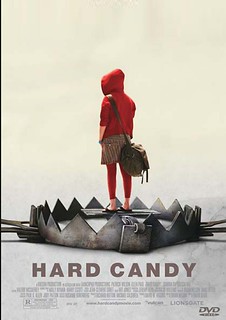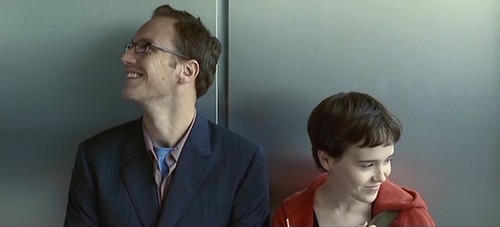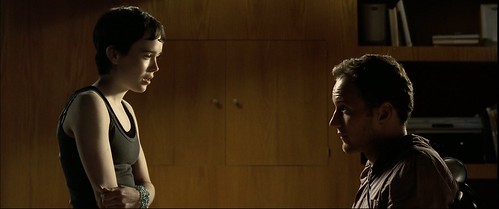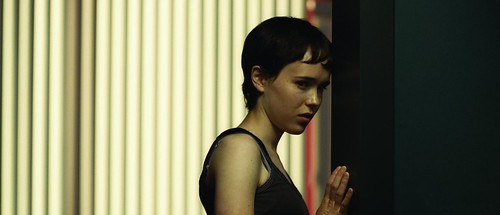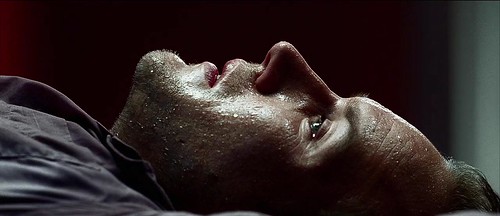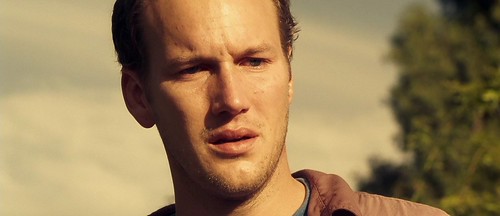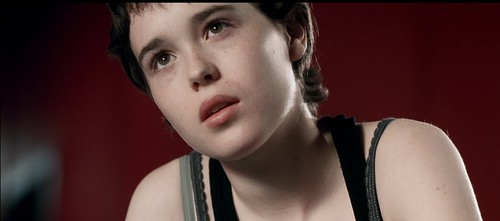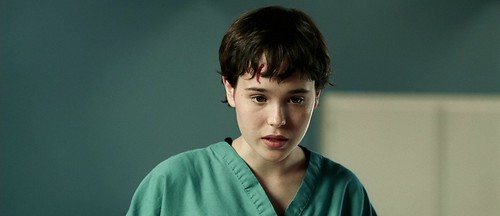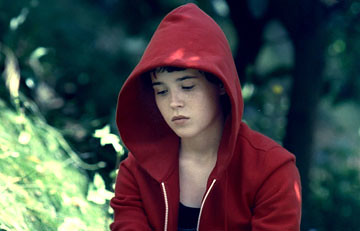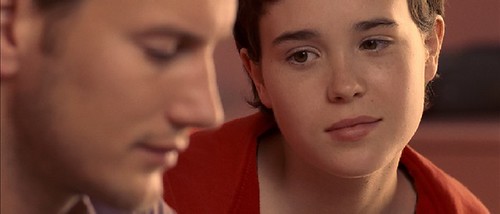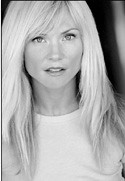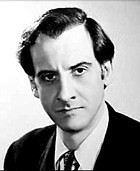HARD CANDY
Your RMC II Results Are In!
Tagline: Strangers shouldn’t talk to little girls.
Cool Dialogue: “The things you do wrong…they haunt you.”
Pizza: GUIDO'S
Preshow Entertainment: PERFECT CRIME, PARADISE
When Ellen Page acts angry, the skin beneath her eyes does that natural rise and involuntary twitch that can only come from actually being incensed, or…from acting chops. Maybe Page was really mad or just maybe she’s a fantastic actress. I go with the latter, and that’s one reason why HARD CANDY (2006) works so incredibly well. Another is co-star Patrick Wilson, who, in a way, has a harder job of character definition. He builds and falls, like a sawtooth wave of emotion. Though as great as he is, we seem to get the sense that Ellen Page is carrying this movie on her tiny Canadian shoulders.
The movie opens with a computer exchange between Lensman319 and Thonggrrrl14. An hour later, when they meet for the first time, Lensman wipes the chocolate frosting off of Thonggrrrl’s lips with his thumb, which he then licks and follows with an innocent - “Mmmm.” It’s a flirt dance that would ordinarily be sexy, if Lensman319 weren’t 32 and Thonggrrrl14, you guessed it - 14. In the age of internet predators, HARD CANDY (a slang term for ‘underage girl’) is very much a story of our time, a tale spun from deceit from both players. This movie could very easily have been a play (I bet it probably will be one day), since it is, in fact, a morality play. But whose POV is being played?
Page is Hayley Stark, a whip-smart teen wise beyond her years. She reads Zadie Smith, so she’s certainly smarter than me (or is it "smarter than I?”). And apparently, she’s a speed-typist, too. She speaks of Elizabeth Wurtzel, and has to school Patrick Wilson’s Jeff on ganouche and Jean Seberg. Jeff tells Hayley just what she wants to hear, and…the trap is set. But what happens next may actually fool you, because this is far from a routine girl-in-jeopardy horror show, where the victim must escape from underneath the salivating mouth of the wolf. No, it doesn’t go there because HARD CANDY is a very cunning psychological thriller. It’s compelling and also disturbing. You’ll witness a scene so intense that even women viewers will cross their legs.
The casting of Wilson (a theater actor…good thinking) and Page is perfect. Hayley may be smart, but Page is smarter, which is good because this is no cardboard cut-out character. And although written brighter and snarkier than any 14-year-old on the planet, Page consistently delivers, especially towards the end, in the one scene where she gets to play off a third actor, Sandra Oh. For the only time in the film, Page is put on the defensive, and we get to see her un-cocky diffident side. And it’s great. Wilson was pretty unknown to moviegoers at the time, which really benefits the film. Although I’m sure they wished for someone more A-list for audience draw, I think the movie would have suffered for it. The actor in this role is better anonymous than Pitt-famous.
It turns out it wasn’t just Page and Wilson who were newbies (meaning, not very famous yet…this was pre-JUNO). CANDY’s core team were all first timers at features; producer David Higgins (his first solo gig after previously producing for others), director David Slade, writer Brian Nelson and editor Art Jones. Higgins (who I did a little work with long ago) wanted to make a very small film, one he could make in his own house if he had to (the script was written with Higgins’s house in mind, in case they couldn’t afford a sound stage), so he hired a playwright - Nelson. Wise, because, as mentioned earlier, it’s very much a play. Armed with just 18 days and a million bucks, they all conspired to make HARD CANDY.
Slade shoots much of the movie in intimate, sometimes uncomfortably so, close-ups. He often holds the camera on one actor, which is great, as we get to see them processing what the other is telling them. They drenched Jeff’s house with a bright palette of candy colors, making it look more like a toy box that invites children to come play. Yet it also provides us with a visual polar opposite of the stygian events being played out before our eyes.
I’m still not sure how I feel about some stylized choices, like speed-ups and jump cuts, wondering if this story would be better told without frills. But come on, if that’s all I could find to punch holes in, that’s saying a lot. If someone pointed a gun at me, I’d probably also say, “maybe Hayley’s artful barbs should have been tapered down. No one, especially at 14, is that Juno-meets-Blofeld when talking about their devious plans.” But I think I’m even wrong about that, because then it would all devolve into a shout-fest and lose so much of its dynamic.
HARD CANDY reminded me of one of my favorite plays, ‘NIGHT MOTHER, another two-hander where Character One has made up their mind to do something ghastly, and all the pleading in the world from Character 2 won’t stop them. “You can’t talk me out of this…” is from HARD CANDY, and from ‘NIGHT MOTHER - “Don’t try and stop me, Mama, you can’t do it.” And then, of course, there’s MISERY whose famous “Whatever you’re thinking of doing, don’t” is replaced here with “Please don’t do this.” That feeling of utter helplessness is a great theme to capture the audience, who is there to try and help (in their heads). Nelson’s airtight script (and I mean that…every T is beautifully crossed) is a complete success, one that writers dream about. Even in structure; the act break occurs at the 21 minute mark, just like all those film courses teach you.
Though everyone involved with HARD CANDY (Wilson, Page, Slade, Nelson) swears up and down that Hayley’s wearing of a red hoodie like Little Red Riding Hood was purely accidental, it sure was a good accident. Sure, the wolf and the captive are here, but unlike Little Red Riding Hood, this tale is less of a bloody smorgasbord and more of a treatise on morality.
SPOILERS: There are really great moments in HARD CANDY, and one of my favorites is one I mentioned earlier. It’s when they meet, when Hayley has icing on her lips and Jeff wipes it off. On first viewing, we’re thinking, “Oh shit, he’s got her right where he wants her.” And on the second viewing, we’re thinking, “Oh shit, she’s got him right where she wants him.” Nice! And if that isn’t enough, if you prefer dialogue over visuals, after he tells her that “People’s faces lie,” she responds with, “Does my face lie?”
PERFECT CRIME – A short from 1955. Okay, this one’s a bit violent, opening with a robber (“bandit,” as the headline says) killing a shop owner and a little girl who just happened to be shopping there. But that’s just a preamble to the actual perfect crime - killing your wife and kid in a car accident while you survive. The whole idea of this piece is that car crashes are crimes, yet these “murders” go unnoticed because the public only cares about people murdered with guns.
The weapon here is speed, and anyone can be a murderer. Even you. But it’s not just speed by itself. There’s bad tires, alcohol, railroad crossings and…overcrowded roads. So is this just another cautionary tale about the dangers of our roads? You’d think so, but no, all this blood-on-the-streets stuff was produced by the Caterpillar Tractor company. It’s all about them asking us to make better roads by writing our congressmen, or asking to pay higher taxes for our roads. They pretty much tell us that we can keep the death rate down but won’t because we don’t care that roads can kill. Because of our lackadaisical attitude we share the guilt of murder while we watch victims removed from car wrecks and loaded into ambulances. “My wife and daughter died on a bad road. I killed them. You helped.”
The real interesting thing about this short is that it was directed by Robert Altman, before he directed tons of TV shows and way before he was a filmmaker.
PACIFIC PARADISE (1937) – Oh boy! This was great. Cliff Edwards (also known as Ukelele Ike), along with other performers, star in this 10 minute short. The last time we saw Edwards at RMC was back in 2003 when we screened the movie HOLLYWOOD REVUE OF 1929. This is one of the shorts directed by George Sidney, who went on to make great movie musicals like KISS ME KATE and BYE BYE BIRDIE. Here, Sydney roves the hell out of the camera, and sets up elaborately choreographed shots. Pretty cool for a musical short.
Tagline: Strangers shouldn’t talk to little girls.
Cool Dialogue: “The things you do wrong…they haunt you.”
Pizza: GUIDO'S
Preshow Entertainment: PERFECT CRIME, PARADISE
IN HARD CANDY, ELLEN PAGE HAS PATRICK WILSON
BY THE BALLS
BY THE BALLS
When Ellen Page acts angry, the skin beneath her eyes does that natural rise and involuntary twitch that can only come from actually being incensed, or…from acting chops. Maybe Page was really mad or just maybe she’s a fantastic actress. I go with the latter, and that’s one reason why HARD CANDY (2006) works so incredibly well. Another is co-star Patrick Wilson, who, in a way, has a harder job of character definition. He builds and falls, like a sawtooth wave of emotion. Though as great as he is, we seem to get the sense that Ellen Page is carrying this movie on her tiny Canadian shoulders.
The movie opens with a computer exchange between Lensman319 and Thonggrrrl14. An hour later, when they meet for the first time, Lensman wipes the chocolate frosting off of Thonggrrrl’s lips with his thumb, which he then licks and follows with an innocent - “Mmmm.” It’s a flirt dance that would ordinarily be sexy, if Lensman319 weren’t 32 and Thonggrrrl14, you guessed it - 14. In the age of internet predators, HARD CANDY (a slang term for ‘underage girl’) is very much a story of our time, a tale spun from deceit from both players. This movie could very easily have been a play (I bet it probably will be one day), since it is, in fact, a morality play. But whose POV is being played?
Page is Hayley Stark, a whip-smart teen wise beyond her years. She reads Zadie Smith, so she’s certainly smarter than me (or is it "smarter than I?”). And apparently, she’s a speed-typist, too. She speaks of Elizabeth Wurtzel, and has to school Patrick Wilson’s Jeff on ganouche and Jean Seberg. Jeff tells Hayley just what she wants to hear, and…the trap is set. But what happens next may actually fool you, because this is far from a routine girl-in-jeopardy horror show, where the victim must escape from underneath the salivating mouth of the wolf. No, it doesn’t go there because HARD CANDY is a very cunning psychological thriller. It’s compelling and also disturbing. You’ll witness a scene so intense that even women viewers will cross their legs.
The casting of Wilson (a theater actor…good thinking) and Page is perfect. Hayley may be smart, but Page is smarter, which is good because this is no cardboard cut-out character. And although written brighter and snarkier than any 14-year-old on the planet, Page consistently delivers, especially towards the end, in the one scene where she gets to play off a third actor, Sandra Oh. For the only time in the film, Page is put on the defensive, and we get to see her un-cocky diffident side. And it’s great. Wilson was pretty unknown to moviegoers at the time, which really benefits the film. Although I’m sure they wished for someone more A-list for audience draw, I think the movie would have suffered for it. The actor in this role is better anonymous than Pitt-famous.
It turns out it wasn’t just Page and Wilson who were newbies (meaning, not very famous yet…this was pre-JUNO). CANDY’s core team were all first timers at features; producer David Higgins (his first solo gig after previously producing for others), director David Slade, writer Brian Nelson and editor Art Jones. Higgins (who I did a little work with long ago) wanted to make a very small film, one he could make in his own house if he had to (the script was written with Higgins’s house in mind, in case they couldn’t afford a sound stage), so he hired a playwright - Nelson. Wise, because, as mentioned earlier, it’s very much a play. Armed with just 18 days and a million bucks, they all conspired to make HARD CANDY.
Slade shoots much of the movie in intimate, sometimes uncomfortably so, close-ups. He often holds the camera on one actor, which is great, as we get to see them processing what the other is telling them. They drenched Jeff’s house with a bright palette of candy colors, making it look more like a toy box that invites children to come play. Yet it also provides us with a visual polar opposite of the stygian events being played out before our eyes.
I’m still not sure how I feel about some stylized choices, like speed-ups and jump cuts, wondering if this story would be better told without frills. But come on, if that’s all I could find to punch holes in, that’s saying a lot. If someone pointed a gun at me, I’d probably also say, “maybe Hayley’s artful barbs should have been tapered down. No one, especially at 14, is that Juno-meets-Blofeld when talking about their devious plans.” But I think I’m even wrong about that, because then it would all devolve into a shout-fest and lose so much of its dynamic.
HARD CANDY reminded me of one of my favorite plays, ‘NIGHT MOTHER, another two-hander where Character One has made up their mind to do something ghastly, and all the pleading in the world from Character 2 won’t stop them. “You can’t talk me out of this…” is from HARD CANDY, and from ‘NIGHT MOTHER - “Don’t try and stop me, Mama, you can’t do it.” And then, of course, there’s MISERY whose famous “Whatever you’re thinking of doing, don’t” is replaced here with “Please don’t do this.” That feeling of utter helplessness is a great theme to capture the audience, who is there to try and help (in their heads). Nelson’s airtight script (and I mean that…every T is beautifully crossed) is a complete success, one that writers dream about. Even in structure; the act break occurs at the 21 minute mark, just like all those film courses teach you.
Though everyone involved with HARD CANDY (Wilson, Page, Slade, Nelson) swears up and down that Hayley’s wearing of a red hoodie like Little Red Riding Hood was purely accidental, it sure was a good accident. Sure, the wolf and the captive are here, but unlike Little Red Riding Hood, this tale is less of a bloody smorgasbord and more of a treatise on morality.
SPOILERS: There are really great moments in HARD CANDY, and one of my favorites is one I mentioned earlier. It’s when they meet, when Hayley has icing on her lips and Jeff wipes it off. On first viewing, we’re thinking, “Oh shit, he’s got her right where he wants her.” And on the second viewing, we’re thinking, “Oh shit, she’s got him right where she wants him.” Nice! And if that isn’t enough, if you prefer dialogue over visuals, after he tells her that “People’s faces lie,” she responds with, “Does my face lie?”
Preshow Entertainment: PERFECT CRIME, PARADISE
PERFECT CRIME – A short from 1955. Okay, this one’s a bit violent, opening with a robber (“bandit,” as the headline says) killing a shop owner and a little girl who just happened to be shopping there. But that’s just a preamble to the actual perfect crime - killing your wife and kid in a car accident while you survive. The whole idea of this piece is that car crashes are crimes, yet these “murders” go unnoticed because the public only cares about people murdered with guns.
The weapon here is speed, and anyone can be a murderer. Even you. But it’s not just speed by itself. There’s bad tires, alcohol, railroad crossings and…overcrowded roads. So is this just another cautionary tale about the dangers of our roads? You’d think so, but no, all this blood-on-the-streets stuff was produced by the Caterpillar Tractor company. It’s all about them asking us to make better roads by writing our congressmen, or asking to pay higher taxes for our roads. They pretty much tell us that we can keep the death rate down but won’t because we don’t care that roads can kill. Because of our lackadaisical attitude we share the guilt of murder while we watch victims removed from car wrecks and loaded into ambulances. “My wife and daughter died on a bad road. I killed them. You helped.”
The real interesting thing about this short is that it was directed by Robert Altman, before he directed tons of TV shows and way before he was a filmmaker.
PACIFIC PARADISE (1937) – Oh boy! This was great. Cliff Edwards (also known as Ukelele Ike), along with other performers, star in this 10 minute short. The last time we saw Edwards at RMC was back in 2003 when we screened the movie HOLLYWOOD REVUE OF 1929. This is one of the shorts directed by George Sidney, who went on to make great movie musicals like KISS ME KATE and BYE BYE BIRDIE. Here, Sydney roves the hell out of the camera, and sets up elaborately choreographed shots. Pretty cool for a musical short.
